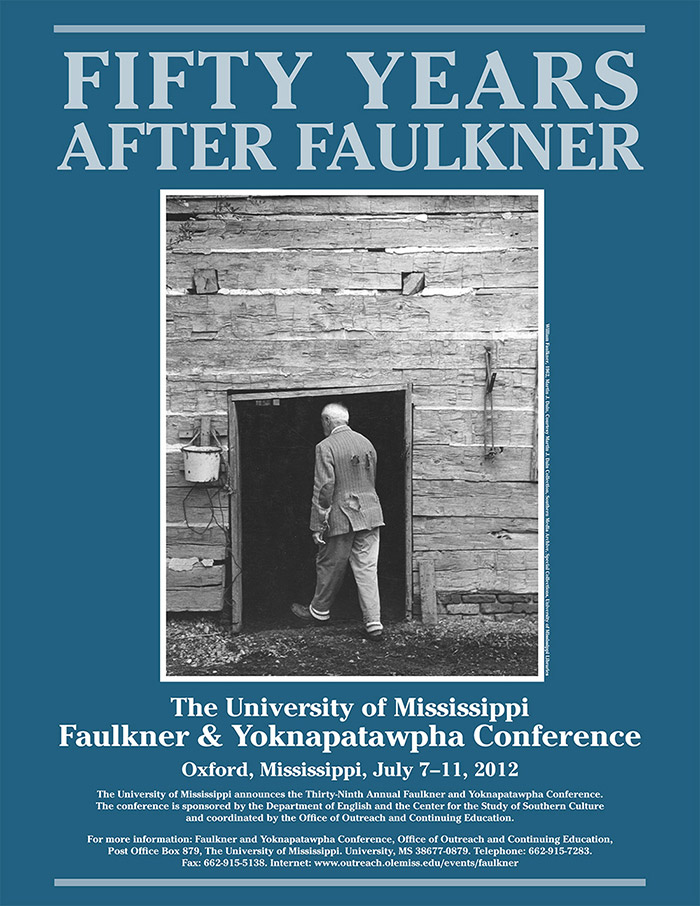
Panel. Faulkner's Wars
Location
Yerby Center Auditorium
Start Date
10-7-2012 9:30 AM
Description
- Finding Faulkner’s War: Frontlines and Homefronts from Yoknapatawpha to Verdun / Dotty J. Dye, Arizona State University
Faulkner’s work is grounded in place and time, as his most famous and canonized work demonstrates, but a more complicated consideration shows that he did not limit himself to that specificity of place and that he actually struggled against such a tendency throughout his career. Rather, he grounds most of his writing in the South, first as a turn to writing about “what he knows” and second to provide a foundation for a more universalizing project. I hope to prompt consideration of the connections, in Faulkner’s fiction, between World War I ravaged France and Civil War ravaged South, as both homespaces and battlefronts and I argue that this correspondence broadens the imaginary world that Faulkner created. - Things are back to normal again: Reassessing Soldiers’ Pay / Jason D. Fichtel, Joliet Junior College
Near the end of Soldiers’ Pay, The Rector claims that “things are back to normal again,” yet despite his hope nothing is ever “back to normal” after the trauma of war. In this essay I explore the ways in which Soldiers’ Pay reveals to us the multiple traumas inflicted on soldier and civilian alike, as well as how Faulkner’s language and technique illustrate his opening salvo in a battle with language itself—to make it say what is too often unsayable. As we gather to commemorate “Fifty Years After Faulkner” there is perhaps no better time for us to reassess Faulkner’s first novel and its attempt to grapple with personal and communal trauma, and the devastation of war. - William Faulkner’s African American Civil War: A Sesquicentennial Consideration / Andrew Leiter, Lycoming College
This essay examines Faulkner’s representations of African Americans during the Civil War era who assert themselves in ways incongruous with romanticized notions of master-slave relationships. Framed by a consideration of Deacon’s claims of service with the Union army in The Sound and the Fury but concentrating primarily on The Unvanquished, this essay contends that Faulkner conceives of the family as an enclosure delimiting African American freedom in a manner comfortable for his white characters. This familial enclosure, however, is less reflective of Faulkner’s defense of racial patriarchy than it is a self-conscious exploration of how whites restructure the African American experience of freedom in a manner at odds with reality.
Relational Format
Conference proceeding
Recommended Citation
Dye, Dotty J.; Fichtel, Jason D.; and Leiter, Andrew, "Panel. Faulkner's Wars" (2012). Faulkner and Yoknapatawpha Conference. 33.
https://egrove.olemiss.edu/fy/2012/schedule/33
COinS
Jul 10th, 9:30 AM
Panel. Faulkner's Wars
Yerby Center Auditorium
- Finding Faulkner’s War: Frontlines and Homefronts from Yoknapatawpha to Verdun / Dotty J. Dye, Arizona State University
Faulkner’s work is grounded in place and time, as his most famous and canonized work demonstrates, but a more complicated consideration shows that he did not limit himself to that specificity of place and that he actually struggled against such a tendency throughout his career. Rather, he grounds most of his writing in the South, first as a turn to writing about “what he knows” and second to provide a foundation for a more universalizing project. I hope to prompt consideration of the connections, in Faulkner’s fiction, between World War I ravaged France and Civil War ravaged South, as both homespaces and battlefronts and I argue that this correspondence broadens the imaginary world that Faulkner created. - Things are back to normal again: Reassessing Soldiers’ Pay / Jason D. Fichtel, Joliet Junior College
Near the end of Soldiers’ Pay, The Rector claims that “things are back to normal again,” yet despite his hope nothing is ever “back to normal” after the trauma of war. In this essay I explore the ways in which Soldiers’ Pay reveals to us the multiple traumas inflicted on soldier and civilian alike, as well as how Faulkner’s language and technique illustrate his opening salvo in a battle with language itself—to make it say what is too often unsayable. As we gather to commemorate “Fifty Years After Faulkner” there is perhaps no better time for us to reassess Faulkner’s first novel and its attempt to grapple with personal and communal trauma, and the devastation of war. - William Faulkner’s African American Civil War: A Sesquicentennial Consideration / Andrew Leiter, Lycoming College
This essay examines Faulkner’s representations of African Americans during the Civil War era who assert themselves in ways incongruous with romanticized notions of master-slave relationships. Framed by a consideration of Deacon’s claims of service with the Union army in The Sound and the Fury but concentrating primarily on The Unvanquished, this essay contends that Faulkner conceives of the family as an enclosure delimiting African American freedom in a manner comfortable for his white characters. This familial enclosure, however, is less reflective of Faulkner’s defense of racial patriarchy than it is a self-conscious exploration of how whites restructure the African American experience of freedom in a manner at odds with reality.

